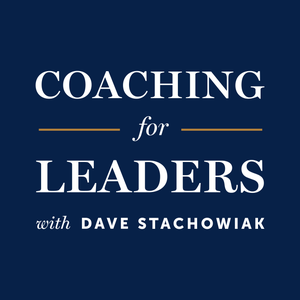
The Liberators Network
The Liberators
If you're excited about unleashing organizational superpowers, then this is the podcast for you. We talk about Scrum, Liberating Structures, and creating better workplaces. This podcast is created by Christiaan Verwijs and Barry Overeem. Both are Professional Scrum Trainers for Scrum.org and stewards of the Professional Scrum Master II class they created. Aside from their extensive background and experience with Scrum, they are very excited about Liberating Structures and are active members of this worldwide community. We publish a new episode every first Friday of the month.
- 21 minutes 33 seconds5 Effective Ways To Increase Management Support For Agile
In our workshops and classes, participants often lament how difficult it is to get “management to do their part”. And my experience in this area has also been one of many struggles. Some managers get Agile and Scrum. But others seem to have made a hobby out of making things as hard as possible.
Many scientific studies have also emphasized “management support” as one of the most critical, or even the most critical, factors to successful Agility. So what can do we as Agilists other than complain or resort to "us vs them"-thinking?
This episode is aimed at helping Scrum and Agile teams who are struggling to get support from management. Our focus is on the simple things you can do, in almost any environment.
Read the full post here:
https://medium.com/the-liberators/5-effective-ways-to-increase-management-support-for-agile-4dccf57bf5e6Support the show, our research, and community offerings via Patreon:
https://patreon.com/liberators
We're building Columinity to help teams improve continuously based on scientific insights:
https://columinity.com
Check out our webshop for tons of powerful exercises and workshops to run with your team(s):
https://shop.theliberators.com
The music for episodes 91 and onward was written and produced for us by Basanite. The music for episodes 1-90 was acquired through Yummy Sounds. Post-production by Jasper Huiskamp.3 January 2025, 9:00 am - 44 minutes 43 secondsIn-Depth: Is SAFe® Really That Bad?
The mere mention of SAFe® often results in groans among Agilists. It isn't hard to find skeptical views of SAFe® and similar large-scale Agile frameworks. Honestly, we're not a fan either.
We also believe we need to ground our beliefs in solid evidence as much as we can. So what is the actual evidence that SAFe® doesn't work or is outright harmful to organizations and teams?
In this episode, we explore the results of several scientific studies and reviews that have attempted to compare scaling approaches. We also report findings from our academic analyses based on data from ~2.000 Agile teams. And the results are ... not what you'd expect. We discuss the implications of the findings in detail and hope it lays the foundation for better conversations around scaling in and around organizations.
Read the full post here:
https://medium.com/the-liberators/in-depth-is-safe-really-that-bad-ed5c5c706e42
Our peer-reviewer paper on the comparison of scaling methods
https://dl.acm.org/doi/10.1145/3571849Support the show, our research, and community offerings via Patreon:
https://patreon.com/liberators
We're building Columinity to help teams improve continuously based on scientific insights:
https://columinity.com
Check out our webshop for tons of powerful exercises and workshops to run with your team(s):
https://shop.theliberators.com
The music for episodes 91 and onward was written and produced for us by Basanite. The music for episodes 1-90 was acquired through Yummy Sounds. Post-production by Jasper Huiskamp.6 December 2024, 9:00 am - 23 minutes 22 secondsIn-Depth: How To Make Pair Programming More Effective
How can we make pair programming more effective? We know that some developers love it, and others hate it.
Pair programming is a common practice in Agile teams. As we reported in our previous episode, the scientific evidence from meta-analyses overwhelmingly shows that pair programming is beneficial for quality and learning, especially for junior and intermediate developers, and particularly for complex tasks.
Several academic investigations have attempted to shine a light on this from different angles. We discuss the impact of personality traits, task complexity, experience, and communication patterns. We also offer a lot of practical evidence-based recommendations.
Read the post here:
https://medium.com/the-liberators/in-depth-how-to-make-pair-programming-more-effective-a47e287cace7
Listen to the previous episode (#97):
https://www.buzzsprout.com/466339/14495424Support the show, our research, and community offerings via Patreon:
https://patreon.com/liberators
We're building Columinity to help teams improve continuously based on scientific insights:
https://columinity.com
Check out our webshop for tons of powerful exercises and workshops to run with your team(s):
https://shop.theliberators.com
The music for episodes 91 and onward was written and produced for us by Basanite. The music for episodes 1-90 was acquired through Yummy Sounds. Post-production by Jasper Huiskamp.1 November 2024, 9:00 am - 25 minutes 44 secondsIn-Depth: The Costs And Benefits Of Pair Programming
We are fans of pair programming. There is something very satisfying about passing the keyboard back and forth and sharing the mind space for a problem with someone else. But other developers hate it for various reasons. Some find it wasteful. Others wonder if the quality isn't just the same, or even worse, than solo developers.
We believe we should ground our opinions in evidence as much as possible. So what does scientific research have to say about pair programming? In this episode, we explore the insights from over 25 academic studies that investigated pair programming. The insights may support your beliefs or challenge them - let's find out!
Read the post:
https://medium.com/the-liberators/in-depth-the-costs-and-benefits-of-pair-programming-b4b54b27c6ffSupport the show, our research, and community offerings via Patreon:
https://patreon.com/liberators
We're building Columinity to help teams improve continuously based on scientific insights:
https://columinity.com
Check out our webshop for tons of powerful exercises and workshops to run with your team(s):
https://shop.theliberators.com
The music for episodes 91 and onward was written and produced for us by Basanite. The music for episodes 1-90 was acquired through Yummy Sounds. Post-production by Jasper Huiskamp.4 October 2024, 8:00 am - 12 minutes 51 secondsScrum Is Just A Recipe
Scrum is great. We love it. And it's also just a recipe. It needs a lot more to result in a flavorful, delicious, and nutritious meal.
Understanding Scrum as merely a recipe has worked well for us to understand both its strengths and limitations. Its a useful metaphor to help others understand what to expect from Scrum and what other ingredients are needed to make it all work.
Read the post:
https://medium.com/the-liberators/scrum-is-just-a-recipe-739665ae70dbSupport the show, our research, and community offerings via Patreon:
https://patreon.com/liberators
We're building Columinity to help teams improve continuously based on scientific insights:
https://columinity.com
Check out our webshop for tons of powerful exercises and workshops to run with your team(s):
https://shop.theliberators.com
The music for episodes 91 and onward was written and produced for us by Basanite. The music for episodes 1-90 was acquired through Yummy Sounds. Post-production by Jasper Huiskamp.6 September 2024, 8:00 am - 24 minutes 32 secondsIn-Depth: How Does Working From Home Influence Teamwork?
How does working from home influence teamwork? This question came to the forefront during the COVID-19 pandemic. Most companies switched from fully co-located work to fully remote work for most of the pandemic. But since then, many of those policies have been reverted under the assumption that working from home negatively impacts performance, productivity, and teamwork.
In this episode, we bring a scientific perspective to this question. We review the current scientific evidence around how working from home affects employees and teams and offer practical recommendations. This episode is relevant to both Agile teams and other kinds of teams.
Read the transcript here:
https://medium.com/the-liberators/in-depth-how-does-working-from-home-influence-teamwork-6a14b4c804aSupport the show, our research, and community offerings via Patreon:
https://patreon.com/liberators
We're building Columinity to help teams improve continuously based on scientific insights:
https://columinity.com
Check out our webshop for tons of powerful exercises and workshops to run with your team(s):
https://shop.theliberators.com
The music for episodes 91 and onward was written and produced for us by Basanite. The music for episodes 1-90 was acquired through Yummy Sounds. Post-production by Jasper Huiskamp.2 August 2024, 8:00 am - 11 minutes 36 secondsThe Church Of Scrum
Have you ever noticed the many parallels between organized religion and Scrum? Or with Agile methodologies more broadly? It's been a recurring joke between us as we attend conferences, interact with critics and advocates of Scrum, and follow the comings and goings in our profession. Some of these parallels are merely funny to point out, whereas others are a bit more concerning.
So for this episode, I invite you to imagine that you’re future archeologists who uncover the traces of our Agile community many thousands of years into the future. How would they understand it? What would it look like to them? And please allow me some exaggeration, as there is a purpose to it that you will discover at the end of the episode.
Read the post here:
https://medium.com/the-liberators/the-church-of-scrum-16e14244b6bcSupport the show, our research, and community offerings via Patreon:
https://patreon.com/liberators
We're building Columinity to help teams improve continuously based on scientific insights:
https://columinity.com
Check out our webshop for tons of powerful exercises and workshops to run with your team(s):
https://shop.theliberators.com
The music for episodes 91 and onward was written and produced for us by Basanite. The music for episodes 1-90 was acquired through Yummy Sounds. Post-production by Jasper Huiskamp.5 July 2024, 8:00 am - 30 minutes 46 secondsIn-Depth: The Evidence-Based Business Case For Agile (Or Why Agile Isn't Dead)
"Agile is dead" is a contrarian opinion that gets thrown around a lot on social media. While it's a nice way to get attention, what does the evidence say? Agile can only be dead if it doesn't work, if it doesn't result in more effective teams and more satisfied customers.
In this episode, we take an evidence-based perspective. We explore the business case for Agile from three perspectives: stakeholder satisfaction, team morale and overall business outcomes. We report results from our own analyses as well as several scientific studies. We'll let the evidence speak for itself.
Read the post here:
https://medium.com/the-liberators/in-depth-the-evidence-based-business-case-for-agile-60f38de3a6d2Support the show, our research, and community offerings via Patreon:
https://patreon.com/liberators
We're building Columinity to help teams improve continuously based on scientific insights:
https://columinity.com
Check out our webshop for tons of powerful exercises and workshops to run with your team(s):
https://shop.theliberators.com
The music for episodes 91 and onward was written and produced for us by Basanite. The music for episodes 1-90 was acquired through Yummy Sounds. Post-production by Jasper Huiskamp.7 June 2024, 8:00 am - 26 minutes 16 secondsIn-Depth: How To Prevent High-Performing Teams From Burning Out
“How do I prevent my high-performing team from burning out?” is a question that recently came up in a community meetup. It's an intriguing question because it starts from a positive situation. If you’ve ever been part of a high-performing team, you know how exhilarating it can be. But paradoxically, it's also a place where people for people to lose themselves in their work together and collapse under the strain — as I did.
In this episode, we apply an evidence-based perspective to this question. What do we know from scientific research about high-performing teams and how they can burn people out? What can do to prevent that, or at least diminish the chance of it happening?
Read the post here:
https://medium.com/the-liberators/in-depth-how-to-prevent-high-performing-teams-from-burning-out-409aa9896caaSupport the show, our research, and community offerings via Patreon:
https://patreon.com/liberators
We're building Columinity to help teams improve continuously based on scientific insights:
https://columinity.com
Check out our webshop for tons of powerful exercises and workshops to run with your team(s):
https://shop.theliberators.com
The music for episodes 91 and onward was written and produced for us by Basanite. The music for episodes 1-90 was acquired through Yummy Sounds. Post-production by Jasper Huiskamp.3 May 2024, 8:00 am - 34 minutes 49 secondsIn-Depth: The Double-Edged Sword Of Diversity In Teams
We're back!
How diverse is your team? Do you have members from different age groups, different genders, different roles, and different cultural backgrounds? Is that diversity beneficial to team performance, or is it challenging, or both?
This was the research question of an academic study we performed with Prof. Daniel Russo. This study has been peer-reviewed and published in the journal "Transactions on Software Engineering". This episode provides a non-technical overview of our investigation, core findings, and practical implications.Read the post:
https://medium.com/the-liberators/in-depth-the-double-edged-sword-of-diversity-in-teams-765ff72a55da
Read the peer-reviewed scientific publication:
https://dl.acm.org/doi/10.1109/TSE.2023.3339881Support the show, our research, and community offerings via Patreon:
https://patreon.com/liberators
We're building Columinity to help teams improve continuously based on scientific insights:
https://columinity.com
Check out our webshop for tons of powerful exercises and workshops to run with your team(s):
https://shop.theliberators.com
The music for episodes 91 and onward was written and produced for us by Basanite. The music for episodes 1-90 was acquired through Yummy Sounds. Post-production by Jasper Huiskamp.5 April 2024, 8:00 am - 26 minutes 13 secondsIn-Depth: How Scrum Motivates Through Shared Goals And High Autonomy
The first thing people tend to see when they look at the Scrum framework are the roles, the artifacts, and the events. But that is only structure. There is much more going on in Scrum teams that we can understand better from other perspectives.
One such perspective is motivation. Scrum is deeply rooted in insights from academic research into what motivates people and teams to become high-performing. And while those roots are strong, they are also mostly invisible and unknown to practitioners.
In this podcast, we take a scientific perspective on how Scrum can create motivating environments for teams and individuals. We also translate these insights into practical tips that you can use to make the work for your team more motivating.
Read the full post behind this episode, including all the links, here
https://bit.ly/3HKZRuESupport the show, our research, and community offerings via Patreon:
https://patreon.com/liberators
We're building Columinity to help teams improve continuously based on scientific insights:
https://columinity.com
Check out our webshop for tons of powerful exercises and workshops to run with your team(s):
https://shop.theliberators.com
The music for episodes 91 and onward was written and produced for us by Basanite. The music for episodes 1-90 was acquired through Yummy Sounds. Post-production by Jasper Huiskamp.4 August 2023, 8:00 am - More Episodes? Get the App
Your feedback is valuable to us. Should you encounter any bugs, glitches, lack of functionality or other problems, please email us on [email protected] or join Moon.FM Telegram Group where you can talk directly to the dev team who are happy to answer any queries.
 Met Groenteman in de kast
Met Groenteman in de kast
 VINK: De podcastgids van Nederland
VINK: De podcastgids van Nederland
 Doppelgänger Tech Talk
Doppelgänger Tech Talk
 Koorts
Koorts
 Coaching for Leaders
Coaching for Leaders
 Scrum Master Toolbox Podcast: Agile storytelling from the trenches
Scrum Master Toolbox Podcast: Agile storytelling from the trenches